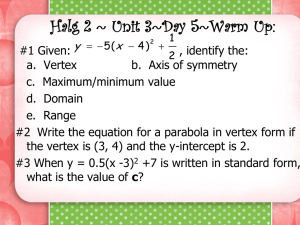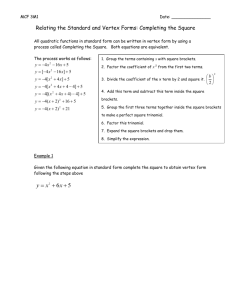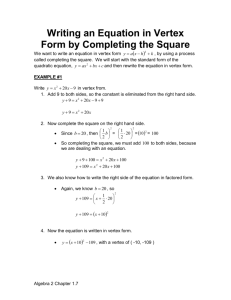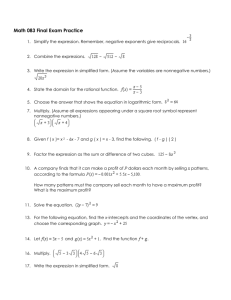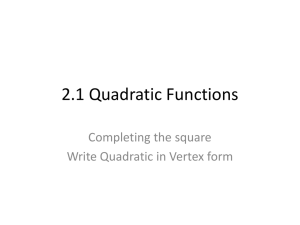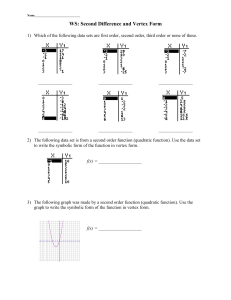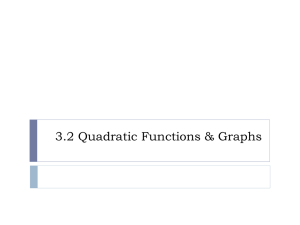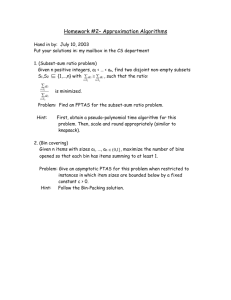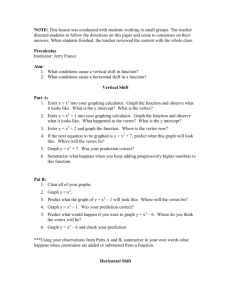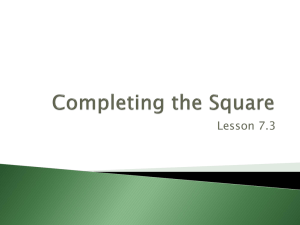Factoring 2 - Completing the Square
advertisement
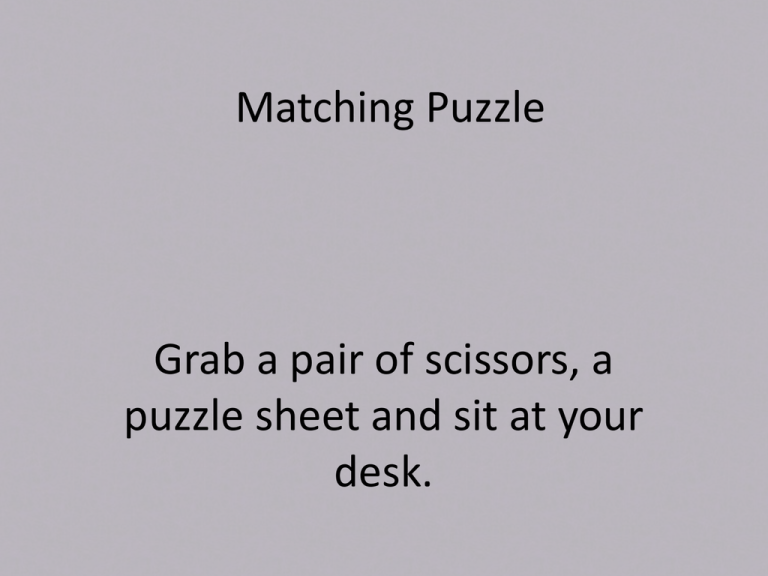
Matching Puzzle Grab a pair of scissors, a puzzle sheet and sit at your desk. Warm up: Write the WHOLE problem down. 1. The data below represents the height of a rocket shot from 150 ft above ground and traveling at a velocity of 50 m/second. Find the quadratic equation that models this data. Seconds 0 Meters 150 1 195.1 2 3 230.44 255.9 4 271.6 5 277.5 2. What form of the quadratic equation did we get from this data? Answer: • 𝑦 = −4.9𝑥 2 + 50𝑥 + 150 • We can look at this equation and determine a few things about the Projectile Motion Function. • 𝑦 = 𝑎𝑥 2 + 𝑣0 x + 𝑠0 • x=time • y=height • a= downward acceleration due to gravity: -4.9 m/s 2 or -16 ft/𝑠 2 • 𝑣0 = initial upward velocity • 𝑠0 =initial height in meters or feet. Follow up • Now find the maximum height reached by the rocket, and how many seconds it took to get there. • In order to answer this question we need to know the______? • Can we determine the vertex given the general equation? • What form to we need? Goal • To convert a quadratic equation from General Form to Vertex Form. • Method: Completing the Square. Factoring: Completing the Square General to Vertex form • We want to go from 𝑎𝑥 2 + 𝑏𝑥 + 𝑐 To 𝑎 𝑥−ℎ 2 +𝑘 Completing the Square Method The two relationships that will allow us to make this conversion are: • ℎ= 𝑏 − 2𝑎 and • 𝑘=𝑐− 𝑏2 4𝑎 Example 1 • Write 𝒚 = 𝒙𝟐 − 𝟏𝟎𝒙 + 𝟏𝟓 in vertex form. • Step 1: identify a,b and c. • a=1, b=-10, c=15 Cont… • Step 2: substitute values into the relations ℎ = 𝑏 𝑏2 − and 𝑘 = 𝑐 − 2𝑎 • ℎ= 4𝑎 −10 − 2∙1 • 𝑘 = 15 − − 10 = 10 2 −10 2 4∙1 =5 = 15 − 100 4 = 15 − 25 = Cont… • Step 3: Substitute the values for h and k into the vertex form. • Vertex form: 𝑎 𝑥 − ℎ 2 + 𝑘 • h=5, k=-10, a=1 (never changed) • Solution: 𝑥 − 5 2 − 10 Example 2 • Factor 𝑥 2 + 10𝑥 + 25 • a=_____, b=______, c=_______ • ℎ= 𝑏 − 2𝑎 and 𝑘 = 𝑐 − 𝑏2 4𝑎 Find h and k. • Plug h and k into 𝑎 𝑥 − ℎ 2 + 𝑘 • Answer: x + 5 2 + 0 = x + 5 2 State the vertex • What is the vertex of the previous problem? x+5 2 • Answer: (-5,0) Example 3: You try • What is the vertex of 𝑦 = 𝑥 2 − 6𝑥 + 11? Example 4: You try again • Write the following equation in vertex form. • 𝑦 = 3𝑥 2 − 12𝑥 + 18 Example 5 • Write the following equation in vertex form. • 𝑦 = (𝑥 − 3)(𝑥 − 9) • Hint: first convert factored form to general form, the change to vertex form) Example 6 • Find the vertex: • 𝑦 = −4(𝑥 + 1)(𝑥 + 3) Homework • 7.3: Skip #2 • This is a big assignment. Pace yourself! • The only way to really understand this stuff is to Practice…A LOT!
